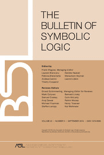
BULLETIN OF SYMBOLIC LOGIC
metrics 2024
Connecting Scholars Through Symbolic Insights
Introduction
BULLETIN OF SYMBOLIC LOGIC, published by Cambridge University Press, is a distinguished academic journal that serves as an essential platform for the dissemination of research in the realms of logic and philosophy. Since its inception in 1995, this journal has progressed through its convergence years and remains committed to fostering intellectual discourse among scholars. With a 2023 ranking in the Q1 category of Philosophy and a Q3 classification in Logic, it continues to uphold its reputation as a significant contributor to the field. While operating under a traditional subscription model, the journal dedicates itself to publishing high-quality articles that explore foundational issues, advanced theories, and innovative insights in symbolic logic. Researchers, professionals, and students will find invaluable resources within its pages, particularly as it ranks favorably among peers, with noteworthy standings in Scopus rankings. For those seeking to deepen their understanding of logical frameworks and their philosophical implications, BULLETIN OF SYMBOLIC LOGIC is an indispensable resource.
Metrics 2024
 0.39
0.39 0.70
0.70 0.70
0.70 40
40Metrics History
Rank 2024
Scopus
IF (Web Of Science)
JCI (Web Of Science)
Quartile History
Similar Journals

Moscow University Mathematics Bulletin
Fostering Innovation in Mathematical ResearchMoscow University Mathematics Bulletin is a distinguished academic journal published by Springer International Publishing AG, focusing on the dynamic field of mathematics. With an ISSN of 0027-1322 and an E-ISSN of 1934-8444, this journal serves as a platform for innovative research and developments in various mathematics sub-disciplines, making significant contributions to both theoretical and applied mathematics. While it holds a Q3 ranking in the field of Mathematics (miscellaneous) for 2023, this journal remains dedicated to fostering academic discourse among mathematicians. Researchers, professionals, and students will find value in the diverse range of articles that embody rigor and creativity. Although currently not an Open Access publication, the journal provides numerous access options through institutional or personal subscriptions. From its inception in 2007 to its expected continuity until 2024, the Moscow University Mathematics Bulletin is committed to enhancing the understanding and appreciation of mathematical sciences.

Logica Universalis
Connecting Scholars through Logic and Applied MathematicsLogica Universalis is an esteemed academic journal published by SPRINGER BASEL AG, dedicated to advancing the fields of Applied Mathematics and Logic. With its ISSN 1661-8297 and E-ISSN 1661-8300, the journal has been active from 2007 and continues to contribute significantly to the discourse surrounding mathematical logic and its applications up to 2024. Located in Basel, Switzerland, Logica Universalis holds a notable position within the academic community, evidenced by its ranking within the Q4 category of both Applied Mathematics and Logic as of 2023. While it currently operates without Open Access options, the journal remains a pivotal resource for researchers and practitioners seeking to explore foundational and applied aspects of logic. Moreover, with a Scopus rank of #22/41 in Logic and #464/635 in Applied Mathematics, it provides a platform for comprehensive knowledge dissemination and facilitates innovative research that bridges theoretical and practical methodologies. This journal is instrumental for anyone looking to deepen their understanding and make meaningful contributions to these intertwined domains.
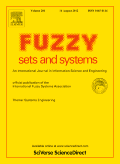
FUZZY SETS AND SYSTEMS
Bridging Theory and Practice in Fuzzy SetsFuzzy Sets and Systems, published by Elsevier, is a leading international journal that delves into the intricate field of fuzzy logic and its applications in various domains, including artificial intelligence and computational mathematics. With a significant impact within its categories—ranking Q2 in Artificial Intelligence and Q1 in Logic for 2023—this journal offers a robust platform for scholars to share cutting-edge research and developments. Focusing on the application of fuzzy set theory to enhance decision-making processes, modeling, and data analysis, it caters to a diverse audience of researchers, industry professionals, and advanced students. The journal's rigorous review process and prestigious ranking, evidenced by its impressive Scopus metrics—2nd in Mathematics & Logic and 120th in Computer Science—underscore its importance in the academic landscape. Contributors are encouraged to explore innovative methodologies, theoretical advancements, and interdisciplinary approaches. Fuzzy Sets and Systems continues to serve as a vital resource for advancing knowledge and fostering collaboration within the fuzzy logic community.
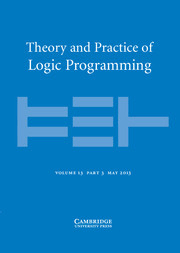
THEORY AND PRACTICE OF LOGIC PROGRAMMING
Bridging Theory and Practice in Computational Excellence.THEORY AND PRACTICE OF LOGIC PROGRAMMING, published by Cambridge University Press, is a premier academic journal that delves into the evolving field of logic programming, offering insights and advancements from 2001 to 2024. With an ISSN of 1471-0684 and an E-ISSN of 1475-3081, this journal serves as a vital resource for researchers, professionals, and students interested in areas such as artificial intelligence, computational theory, and software development. In 2023, the journal was recognized for its excellence, achieving Q1 status in Computational Theory and Mathematics and Q2 in several other categories, underscoring its significant impact within the academic community. Despite not being open access, its robust content, curated by esteemed scholars, guarantees high-quality research and innovative methodologies that are crucial for advancing the field. The journal's rigorous peer-review process and its standings in Scopus rankings further emphasize its relevance and authority, making it a quintessential platform for disseminating key findings and fostering scholarly dialogue.
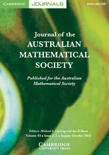
JOURNAL OF THE AUSTRALIAN MATHEMATICAL SOCIETY
Connecting researchers to the heart of mathematical discovery.JOURNAL OF THE AUSTRALIAN MATHEMATICAL SOCIETY, published by Cambridge University Press, is a prestigious journal dedicated to advancing research and scholarship in the field of mathematics. With a long-standing history since its inception in 1959, the journal has established itself as a vital resource for mathematicians, researchers, and students worldwide. Operating under an Open Access model, it ensures that high-quality research is accessible to all, enhancing the dissemination of knowledge and fostering collaboration in the mathematical community. The journal holds a commendable Q2 ranking in the 2023 Mathematics (miscellaneous) category and is ranked #145 in Scopus among general mathematics journals, placing it in the 63rd percentile, which reflects its significant influence and reputation in the discipline. The JOURNAL OF THE AUSTRALIAN MATHEMATICAL SOCIETY continues to provide a platform for innovative mathematical research and critical discourse within the field, making it an invaluable asset for professionals and aspiring mathematicians alike.

Journal of Logic Language and Information
Bridging Disciplines: Where Logic Meets LanguageThe Journal of Logic Language and Information, published by SPRINGER, stands as a leading interdisciplinary platform dedicated to the exploration of the interconnections between logic, language, and information theory. With a history spanning from 1992 to 2024, this esteemed journal provides a vital forum for researchers, professionals, and students in fields such as Computer Science, Linguistics, and Philosophy. Notably recognized in the 2023 rankings, it holds a Q2 quartile in Computer Science (miscellaneous) and Q1 quartiles in both Linguistics and Language, and Philosophy, reflecting its high academic quality and relevance. Despite its nuanced focus, the journal's diverse scope attracts a global readership, encouraging innovative research and critical discourse. Although it is not an Open Access publication, the Journal's valuable contributions can be accessed through various institutional subscriptions, ensuring that its scholarly output remains influential within the academic community.
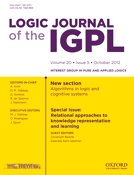
LOGIC JOURNAL OF THE IGPL
Championing Critical Developments in LogicLOGIC JOURNAL OF THE IGPL, published by Oxford University Press, stands as a prominent outlet for scholarly work in the field of logic and philosophy. With its ISSN 1367-0751 and E-ISSN 1368-9894, this journal has been a pivotal platform since its inception, covering critical developments in logical theory, methodology, and applications as well as fostering interdisciplinary dialogue with philosophical inquiries. The journal's impressive ranking in the 2023 Scopus metrics, placing it in the 76th percentile for Mathematics - Logic and categorized in Q2 in Philosophy, underscores its significant impact and relevance. Researchers, professionals, and students alike will benefit from its rich repository of innovative ideas and perspectives, with access options that afford a greater reach to the academic community as well as a commitment to advancing the field until 2024 and beyond. Whether you're exploring the nuances of formal systems or the implications of logic in philosophical contexts, the LOGIC JOURNAL OF THE IGPL offers essential insights that contribute to the ongoing discourse.

JOURNAL OF LOGIC AND COMPUTATION
Transforming Ideas into Theoretical InnovationsJOURNAL OF LOGIC AND COMPUTATION, published by Oxford University Press, is a leading peer-reviewed journal dedicated to advancing research in the intersections of logic, computation, and theoretical frameworks of computer science. With an ISSN of 0955-792X and an E-ISSN of 1465-363X, the journal has established itself within academic circles, boasting significant impact evidenced by its category quartiles, including a Q1 ranking in Arts and Humanities (miscellaneous) and a Q2 in Logic for 2023. This prestigious journal emphasizes interdisciplinary approaches to understanding computational systems, hence targeting a diverse audience of researchers, professionals, and students keen on exploring provocative questions in logic and computation. Although not open access, the content is highly valuable, reflecting contemporary challenges and advancements in the field. With over three decades of published work, spanning from 1990 to 2024, the journal continues to contribute richly to the discourse surrounding logical methodologies and computational innovations, making it an essential resource for those engaged in these dynamic areas of study.
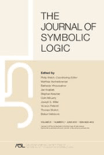
JOURNAL OF SYMBOLIC LOGIC
Challenging Conventional Thought Through Rigorous ResearchThe JOURNAL OF SYMBOLIC LOGIC, published by Cambridge University Press, stands as a leading platform for scholarly discourse in the realms of logic and philosophy. With a rich history dating back to 1938, this esteemed journal is dedicated to presenting cutting-edge research that pushes the boundaries of knowledge within symbolic logic and its applications. In 2023, it proudly holds a distinguished Q1 ranking in both Logic and Philosophy categories, reflecting its high impact and relevance in the academic community. Researchers and academics benefit from its rigorous peer-review process and contributions from leading scholars worldwide, ensuring the dissemination of high-quality research and critical theories. While the journal currently does not operate under an open access model, it remains a pivotal resource for professionals seeking to deepen their understanding of logical theories and philosophical inquiries. Explore the JOURNAL OF SYMBOLIC LOGIC to engage with scholarly articles that challenge conventional thought and inspire future research.

Logic and Logical Philosophy
Unraveling the Threads of ReasonLogic and Logical Philosophy is a distinguished journal published by Nicolaus Copernicus University Torun, Poland. With its ISSN 1425-3305 and E-ISSN 2300-9802, the journal has established itself as a premier outlet for cutting-edge research in the field of philosophy, specifically focusing on the intricate intersections of logic and philosophical inquiry. Since its inception, the journal has consistently demonstrated its impact within the academic community, achieving a commendable Q1 ranking in the 2023 Arts and Humanities category, placing it in the 73rd percentile of publications in the field. The journal aims to foster scholarly dialogue and contribute significantly to the advancement of philosophical understanding through rigorous research articles, critical reviews, and discussions. With a commitment to high academic standards and accessibility—though specific access options may vary—Logic and Logical Philosophy remains an essential resource for researchers, professionals, and students alike, paving the way for innovative philosophical discourse until 2024 and beyond.